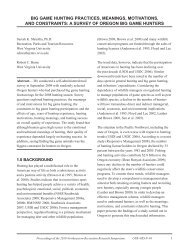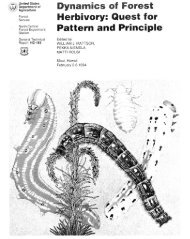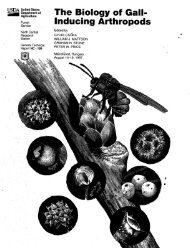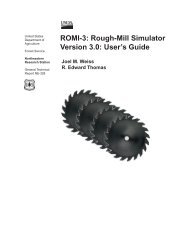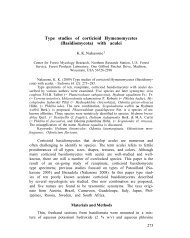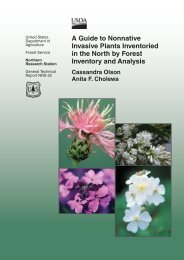Proceedings of the 2009 northeastern recreation research symposium
Proceedings of the 2009 northeastern recreation research symposium
Proceedings of the 2009 northeastern recreation research symposium
You also want an ePaper? Increase the reach of your titles
YUMPU automatically turns print PDFs into web optimized ePapers that Google loves.
onds within a social group is a mechanism for cohesion<br />
and survival in diversifi ed social systems, and such bonds<br />
<strong>of</strong>ten last a lifetime. Th ere is safety and security in a<br />
social group <strong>of</strong> individuals that share symbols, permeable<br />
social boundaries, tastes, a social order, accepted norms,<br />
and established patterns <strong>of</strong> behavior, which ultimately<br />
provide a means to achieve life satisfaction (Cheek and<br />
Burch 1976).<br />
Leisure resourcefulness is knowing how to—and being<br />
able to—make a meaningful life for oneself within <strong>the</strong><br />
realities <strong>of</strong> one’s own existence. In this <strong>research</strong>, leisure<br />
knowledge was a signifi cant predictor <strong>of</strong> life satisfaction.<br />
Knowledge infl uences many aspects <strong>of</strong> empowerment in<br />
human behavior, including, for example, one’s adaptive<br />
environment, social organization, social and cultural<br />
milieu, and choices to satisfy physical, mental, and<br />
biological needs at a point in time along <strong>the</strong> life-cycle<br />
continuum.<br />
Th ese <strong>research</strong> fi ndings challenge leisure educators to<br />
develop basic leisure and <strong>recreation</strong> courses as elective<br />
courses, if not required general education courses for<br />
graduation requirements. Leisure service providers<br />
are also challenged to emphasize education for leisure<br />
as an extension <strong>of</strong> normal <strong>recreation</strong> activity and/or<br />
interpretive <strong>of</strong>f erings.<br />
7.0 CITATIONS<br />
Cheek, N.H.; Burch, W.R. 1976. Th e social<br />
organization <strong>of</strong> leisure in human society. New York:<br />
Harper and Row.<br />
De Graaf, J.; Wann, D.; Naylor, T.H. 2005. Affl uenza:<br />
Th e all-consuming epidemic. San Francisco: Berrett-<br />
Koehler Publishers.<br />
Havinghurst, R.J.; Neugarten, B.L.; Tobin, S.S. 1961.<br />
Th e measurement <strong>of</strong> life satisfaction. Journal <strong>of</strong><br />
Gerontology. 16: 134-143.<br />
Rapoport, R.; Rapoport, R.N. 1975. Leisure and <strong>the</strong><br />
family life cycle. Boston: Routledge and Kegan Paul.<br />
Ricciardo, J.L. 2005. Th e relationship among leisure<br />
resourcefulness and <strong>recreation</strong> specialization among<br />
a sample <strong>of</strong> senior adults. In: Bricker, K., comp.,<br />
ed. <strong>Proceedings</strong> <strong>of</strong> <strong>the</strong> 2004 Nor<strong>the</strong>astern Recreation<br />
Research Symposium. GTR-NE-326. Newtown<br />
Square, PA: U.S. Department <strong>of</strong> Agriculture, Forest<br />
Service, Nor<strong>the</strong>astern Research Station. 397-403.<br />
Shor, J. 1991. Th e overworked American: Th e<br />
unexpected decline in leisure. New York: Basic<br />
Books.<br />
The content <strong>of</strong> this paper refl ects <strong>the</strong> views <strong>of</strong> <strong>the</strong> authors(s), who are<br />
responsible for <strong>the</strong> facts and accuracy <strong>of</strong> <strong>the</strong> information presented herein.<br />
<strong>Proceedings</strong> <strong>of</strong> <strong>the</strong> <strong>2009</strong> Nor<strong>the</strong>astern Recreation Research Symposium GTR-NRS-P-66<br />
270






